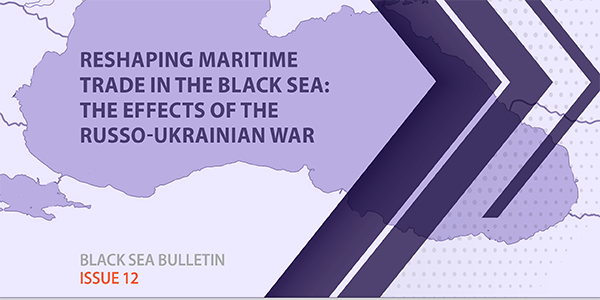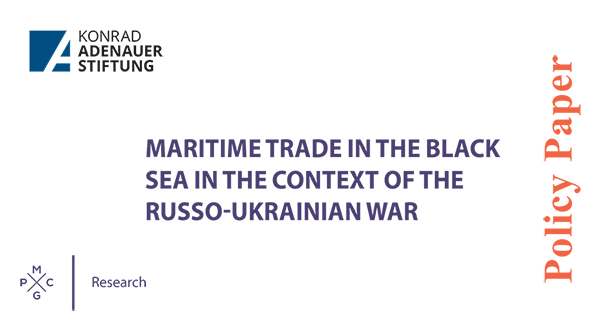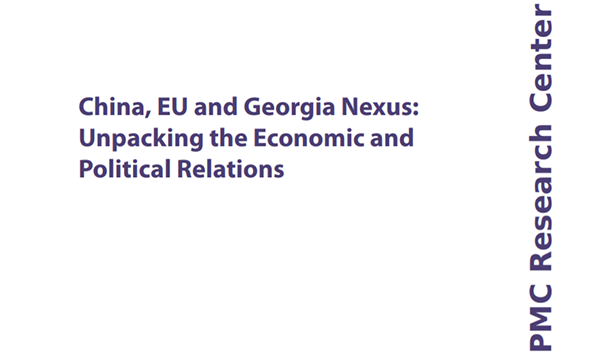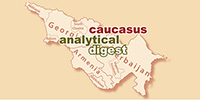

Shortly after Russia’s full-scale invasion of Ukraine in February 2022, maritime trade flows in the Black Sea were significantly reshaped. As the war continued, developments affecting the trade in the Black Sea changed, underscoring the importance of thoroughly analyzing how the region has adapted to such disruptions. This publication builds upon the previous edition, which was released shortly after the outbreak of the war. Now, three years later, our focus shifts to examining how trade dynamics, particularly maritime trade in the Black Sea region, have evolved during this period.
Key insights include:
- Upon the outbreak of the Russo-Ukrainian War, port calls in Ukraine and Russia dropped sharply, while other Black Sea countries briefly benefited from redirected trade flows. By late 2023, port calls in Ukraine had gradually recovered, supported by new shipping routes through Romania and Bulgaria. However, serious threats to commercial shipping remained.
- Ukraine’s maritime exports and imports fell sharply in 2022, with a slow recovery in imports in 2023. In Russia, maritime imports declined, while exports initially increased in 2022, possibly due to sanctions being ineffective. However, as the sanctions intensified, exports also fell significantly the following year.

The Trans-Caspian route, widely known as the Middle Corridor, has become a vital trade link connecting Georgia and Central Asia, driven by significant geopolitical developments in recent years. The Russia-Ukraine war, which began in 2022, has been a key factor in this shift. As the Middle Corridor gains prominence, economic and political relations between Georgia and Central Asian nations, particularly Kazakhstan, have strengthened. This paper seeks to facilitate bilateral trade between Georgia and Kazakhstan by identifying new, potentially profitable products for exchange and exploring Georgia’s role as a transit corridor for Central Asia.

The war in Ukraine has significantly altered trade dynamics in the Black Sea region. Firstly, it has created security challenges and increased tensions between countries. On the other hand, it has also unlocked opportunities to utilize the potential of the Black Sea as a strategic location and international transport route. With this context in mind, it is important to analyze intra-Black Sea countries’ trade, to identify the patterns and volumes of goods exchanged among these countries, and to determine the dynamics of regional economic cooperation and transportation networks. This bulleting provides analysis of the trade data of Black Sea countries and present the main trends in trade in and among Black Sea countries and provides some recommendations on how to both address existing challenges and realize opportunities

This paper set out to provide transportation planners and policymakers with a systematic process through which to estimate costs representative of the area and service in question and to ease their analysis and decision-making procedures. Although the methodology presented herein is not meant to replace the in-depth and detailed feasibility studies or professional railroad planning activities, it can be used as an intermediate tool to allow planners to more easily perform railroad analysis and planning activities, prior to contracting out feasibility studies. Finally, should this research be further developed, it ought to address other categories of railway services, such as intercity and high-speed trains.

Since mid-2020, when stringent restrictions were imposed to combat the spread of the COVID-19 pandemic, inflation has been running at multi-decade highs in many countries across the globe. In 2022 in particular, inflationary pressures from pandemic-related disruptions were exacerbated by the Russo-Ukrainian War and spiking food and energy prices. In response, central banks implemented different monetary policy approaches in an attempt to stabilize the situation. Against this background, recent inflationary trends and monetary policy approaches adopted by economically diverse Black Sea countries are analyzed and compared in this issue of Black Sea bulletin.

The Black Sea region is often referred to as a gateway between Europe and Asia, though its potential benefits are far from being fully realized. This is especially true for maritime trade - the Black Sea region’s share in international maritime trade is only just 2.5%, while the North Sea region accounts for 17%. And despite there being huge potential in the enhancement of port infrastructure and connectivity in the Black Sea region countries, the varying and distinctive geopolitical orientations of these countries largely hinder any significant advancement in regional cooperation.
The problem became even more severe with the latest military conflict in the region – the Russian invasion of Ukraine in February 2022, which besides aggravating cooperation problems has significantly shaken up the landscape of the Black Sea’s port infrastructure and maritime trade in the region and the security dynamics not only in the wider Black Sea region, but it has also affected the European and, arguably, global security architecture.

The main objective of the research is to study the impacts that free trade agreements with the EU (DCFTA) and China had on Georgian economy and political implications that they might result in.

The following research discusses the New Peace Initiative entitled “A Step to A Better Future,” launched in April 2018 by the Government of Georgia.

Publication provides an overview of how the initiative could advance relations between China and the three countries of the South Caucasus, namely Armenia, Azerbaijan, and Georgia. The publication also sketched out the dynamics of the BRI related to transport connectivity, bilateral trade and foreign direct investment.

The purposes of this policy paper are to present the priorities of the Government of Georgia (GoG) in economic diplomacy, to map economic diplomacy institutions, and to describe their functions. It also aims to present practical cases of conducting economic diplomacy. Case studies of selected EU Member States which have assigned strategic importance to economic diplomacy in achieving their economic development goals are presented and these contribute to the elaboration of recommendations for Georgia.
- Periodic Issues
- ECONOMIC OUTLOOK AND INDICATORS IN GEORGIA
- HOTEL PRICE INDEX
- PMC RESEARCH - IFO GEORGIAN ECONOMIC CLIMATE
- BLACK SEA BULLETIN
- QUARTERLY TOURISM UPDATE
- ECONOMIC OUTLOOK AND INDICATORS IN UKRAINE
- SECTOR SNAPSHOTS
- EMPLOYMENT TRACKER
- MACRO OVERVIEW
- BAG Index
- Profile Of Bilateral Relations

